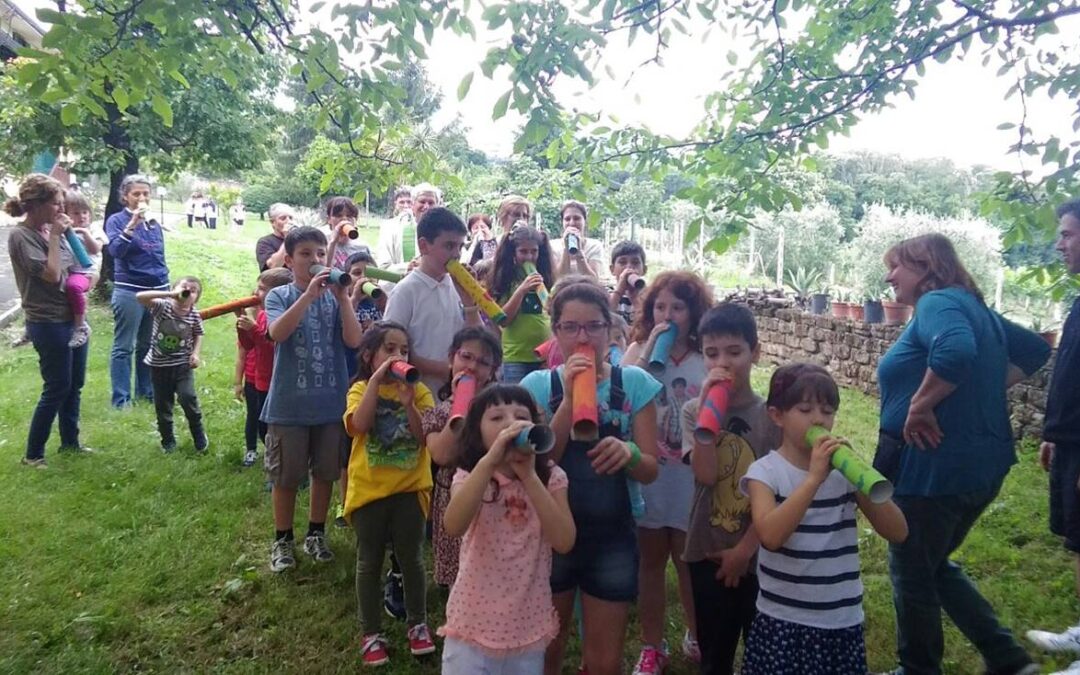
Sep 5, 2016 | Non categorizzato
 Elisa with the entire family – a twin brother, an elder brother, daddy, and the grandmothers – just a few weeks earlier, had been to the Mariapolis – the Focolare’s summer gathering – with about a hundred other people. It had been an occasion to know each other, share life experiences, and take a step ahead together. Everyone remembers Elisa who before leaving, with her gay and contagious ways had shot a video of the impressions of her group with the help of her twin brother. “The Mariapolis is an experience that leaves its mark in one’s heart forever. I hope to go to the Mariapolis always,” she had texted her mother upon returning home. Instead, Gabriele, her little 8-year-old cousin, in mid-June had participated for the second consecutive year in the little “Gen4 congress.” It was an enchanting three-day event with the little kids who understand “the things of God” better than anyone else. A photo shows him in the role of an angel playing a trumpet upon the passage through the Door of Mercy, together with all the other boys. In the morning of 24 August the news of the earthquake arrived, and also the anguish: Elisa, Gabriele and their grandmothers were under the ruins and all feared the outcome for those who were missing. A chain of prayers immediately started like a tam-tam, but in the evening it was confirmed: they didn’t make it.
Elisa with the entire family – a twin brother, an elder brother, daddy, and the grandmothers – just a few weeks earlier, had been to the Mariapolis – the Focolare’s summer gathering – with about a hundred other people. It had been an occasion to know each other, share life experiences, and take a step ahead together. Everyone remembers Elisa who before leaving, with her gay and contagious ways had shot a video of the impressions of her group with the help of her twin brother. “The Mariapolis is an experience that leaves its mark in one’s heart forever. I hope to go to the Mariapolis always,” she had texted her mother upon returning home. Instead, Gabriele, her little 8-year-old cousin, in mid-June had participated for the second consecutive year in the little “Gen4 congress.” It was an enchanting three-day event with the little kids who understand “the things of God” better than anyone else. A photo shows him in the role of an angel playing a trumpet upon the passage through the Door of Mercy, together with all the other boys. In the morning of 24 August the news of the earthquake arrived, and also the anguish: Elisa, Gabriele and their grandmothers were under the ruins and all feared the outcome for those who were missing. A chain of prayers immediately started like a tam-tam, but in the evening it was confirmed: they didn’t make it. 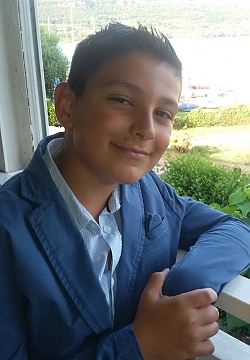 Their families immediately gave an unwavering testimony: “Their faith in God’s love was such that even in this immense suffering, they enlightened us with renewed determination to live for that which does not pass”, wrote Maria Voce, President of the Focolare, to the stricken communities and families, the day after the earthquake. Meanwhile the Focolare communities throughout the world and Italy had launched the rescue system.
Their families immediately gave an unwavering testimony: “Their faith in God’s love was such that even in this immense suffering, they enlightened us with renewed determination to live for that which does not pass”, wrote Maria Voce, President of the Focolare, to the stricken communities and families, the day after the earthquake. Meanwhile the Focolare communities throughout the world and Italy had launched the rescue system.
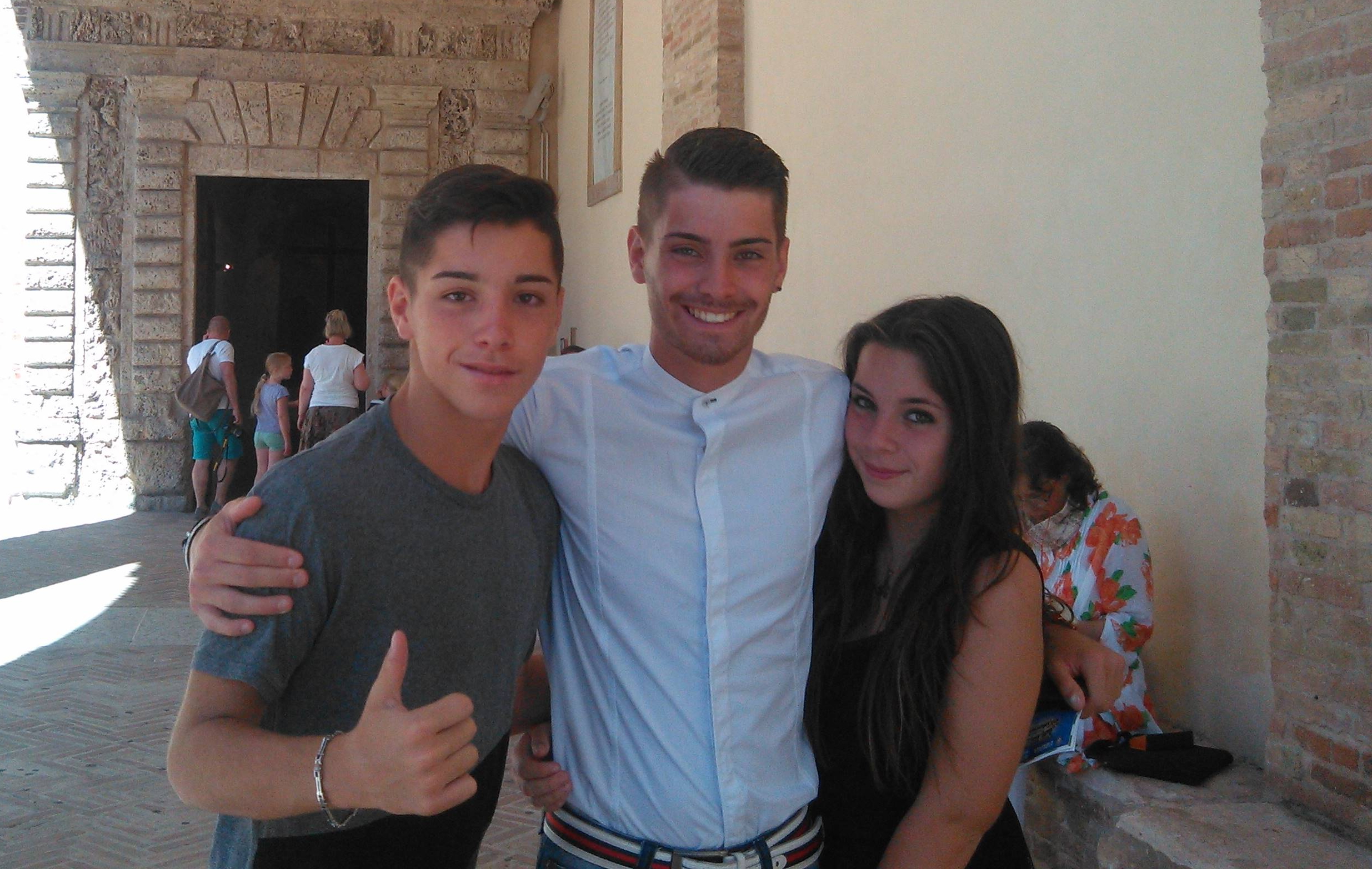
Elisa with her two brothers
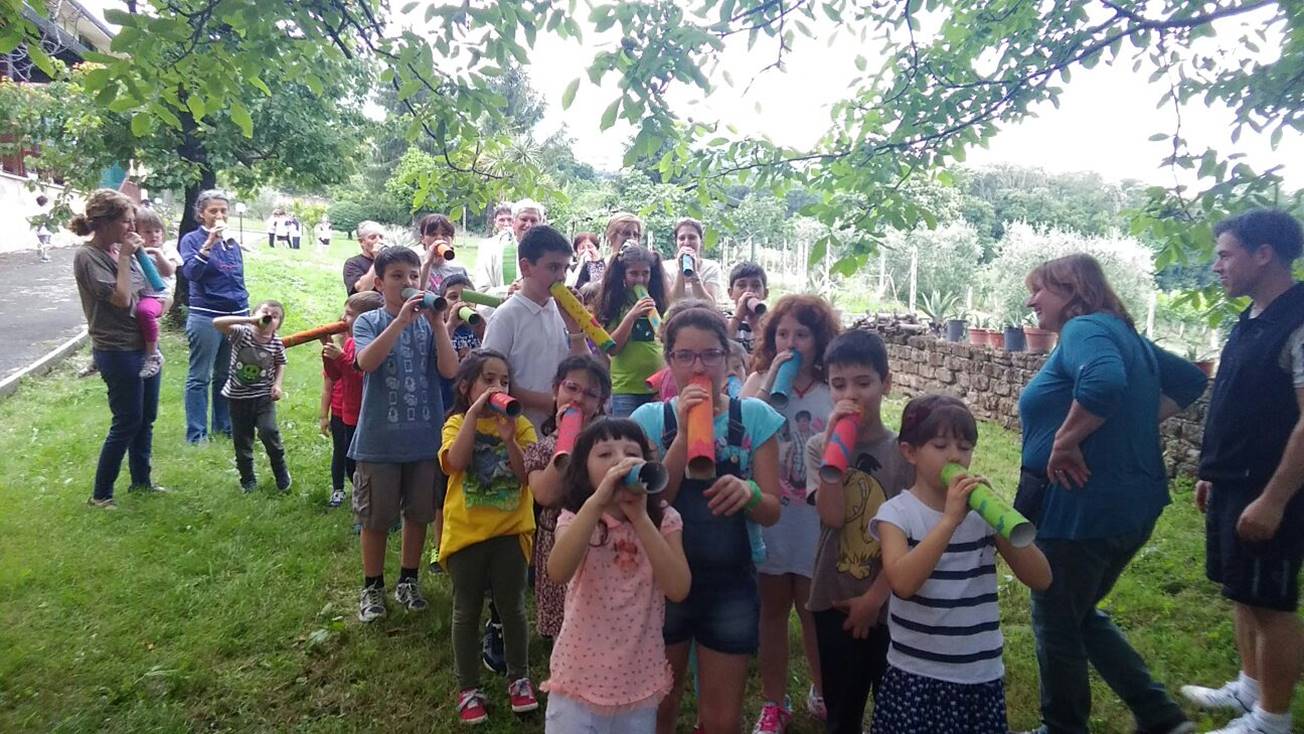
Gabriele at the Mariapolis

Sep 4, 2016 | Non categorizzato
 “Mother Teresa is … a great teacher of the art of loving. She truly loved everyone. She didn’t ask her neighbour if he or she was Catholic, Hindu, Muslim, etc. … Undoubtedly, Mother Teresa was the first to love. She went out looking for those entrusted to her by God. Mother Teresa saw Jesus in every person, perhaps in a way no others did. Her motto was: “You did it for me.” Mother Teresa made herself one with everyone. She made herself poor with the poor and especially in the same way as the poor. … She didn’t accept anything that the poor couldn’t have as well. We know, for example, that she and her sisters do without having even a simple washing machine, something that many people do not understand. They say: “Nowadays!” But she did not want one because the poor don’t have them. She took upon herself and identified herself with the wretchedness of the poor, their grief, their sickness and death. Mother Teresa loved everyone as herself, to the point of offering others her own ideal. For example, she invited the volunteers who spent a period of time serving in her Work to seek out their own “Calcutta” when they went home to their countries. She said: it is because there are poor people everywhere. Mother Teresa certainly loved her enemies. She never stopped to dispute the absurd accusations they made against her, but she prayed for her enemies. Yes, in her we can see “the art of loving” lived to perfection. She was … a queen of charity.” Chiara Lubich Message during a Conference Call on 25th September 1997.
“Mother Teresa is … a great teacher of the art of loving. She truly loved everyone. She didn’t ask her neighbour if he or she was Catholic, Hindu, Muslim, etc. … Undoubtedly, Mother Teresa was the first to love. She went out looking for those entrusted to her by God. Mother Teresa saw Jesus in every person, perhaps in a way no others did. Her motto was: “You did it for me.” Mother Teresa made herself one with everyone. She made herself poor with the poor and especially in the same way as the poor. … She didn’t accept anything that the poor couldn’t have as well. We know, for example, that she and her sisters do without having even a simple washing machine, something that many people do not understand. They say: “Nowadays!” But she did not want one because the poor don’t have them. She took upon herself and identified herself with the wretchedness of the poor, their grief, their sickness and death. Mother Teresa loved everyone as herself, to the point of offering others her own ideal. For example, she invited the volunteers who spent a period of time serving in her Work to seek out their own “Calcutta” when they went home to their countries. She said: it is because there are poor people everywhere. Mother Teresa certainly loved her enemies. She never stopped to dispute the absurd accusations they made against her, but she prayed for her enemies. Yes, in her we can see “the art of loving” lived to perfection. She was … a queen of charity.” Chiara Lubich Message during a Conference Call on 25th September 1997.
Reead more: The magnificat of Mother Theresa of Calcutta as received by Chiara Lubich – Press releases SIF– 1° Settembre 2016
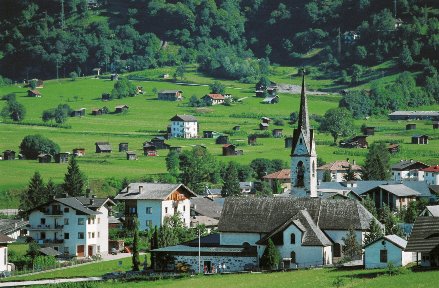
Sep 3, 2016 | Focolare Worldwide
 In 1959 the last of the earliest Mariapolises (cities of Mary) was held in Fiera di Primiero, Italy. The Mariapolis is probably the Focolare’s most characteristic event in which young and old people of all backgrounds spend several days together for an experience of fraternity in the light of of the universal values of the Gospel. Nowadays Mariapolises are held every year in an increasing number of countries, presenting the Golden Rule in a variety of cultural settings. On August 22, 1959 when the Cold War was in full swing and setting the Western Bloc in opposition to the Soviet Bloc, people from 27 countries who were attending the Mariapolis decided to consecrate themselves and their people of their nations to Mary. Their act of consecration was recited in nine languages and made that small “people” at the Mariapolis realize that the life of unity which was revealed and experienced in Primiero was destined to spread throughout the world. Today’s “clash of incivility” and the chaotic relations between states highlights the significance of that 1959 proposal. On August 27-28, 2016 the newly assembled Municipality of Primiero hosted a conference titled “Peoples in the Human Family”, which had as speakers Lawyer Gianni Caso, honorary president of the Supreme Court and Vincenzo Bonomo, director of the Law School at the Pontifical Lateran University. Nowadays we do not talk about peoples, but rather of states. The peoples of the world are the result of natural combinations. They own the right of self-determination; whereas, states even come to deny the existence of indigenous peoples in order not to recognize their right to self-determination. It is preferable to speak of “civil society” which, at best, can have an opinion. Peoples do not have an opinion: they have a right to self-determination and expect that right to be upheld. “Peace among peoples is the order that is willed by God,” Chiara Lubich said. And she entrusted the peoples of the world to Mary, not the states. She entrusted them to Mary as their defender, because the peoples of the world have the right to be defended. “Now, we no longer have a Cold War,” Bonomo acknowledges, “but there is a cold peace which is perhaps worse, because it is peace or a presumption of peace that is not based on shared values.” What remains today of that 1959 consecration? The proclamation of those principles is still as timely as it ever was as we try to find our way on the difficult geopolitical landscape of today’s world. For the speakers at the conference it remains the method for interpreting the facts; it remains an important means of the vision of a united world, which does not abolish the differences but celebrates them. Today there is a desire to rediscover the prophetic values that were sanctioned during that August of 1959, and the people at this year’s conference have shown zeal and determination to do that. One local politician, the Mayor of the Municipality of Primiero said that the Mariapolis of Primiero should not merely be a tourist attraction for the valley but, with its values, finally change our life.” There is need to make Chiara Lubich’s legacy grow and change Primiero into a laboratory of brotherhood among peoples. This process has also been seen in the recent not-so-easy unification of four municipalities: Fiera di Primiero, Siror, Tonadico and Transacqua. They represent four small “peoples’ that for the sake of the common good chose communion. Those that who had lived that experience 50 years ago talk about “having planted seeds that still need watering.” During the discussions a connection was made between the “Spirit of Assisi” with its relationships among religions and the “Spirit of Primiero” with its relationships among the peoples of the world. On the morning of Sunday, August 28, 2016 the 1959 act of consecration was recited again in the same crowded church of Fiera di Primiero. It was a festive sign of a newer, deeper and more responsible idea of what peace means. By Roberto Di Pietro Source: Città Nuova
In 1959 the last of the earliest Mariapolises (cities of Mary) was held in Fiera di Primiero, Italy. The Mariapolis is probably the Focolare’s most characteristic event in which young and old people of all backgrounds spend several days together for an experience of fraternity in the light of of the universal values of the Gospel. Nowadays Mariapolises are held every year in an increasing number of countries, presenting the Golden Rule in a variety of cultural settings. On August 22, 1959 when the Cold War was in full swing and setting the Western Bloc in opposition to the Soviet Bloc, people from 27 countries who were attending the Mariapolis decided to consecrate themselves and their people of their nations to Mary. Their act of consecration was recited in nine languages and made that small “people” at the Mariapolis realize that the life of unity which was revealed and experienced in Primiero was destined to spread throughout the world. Today’s “clash of incivility” and the chaotic relations between states highlights the significance of that 1959 proposal. On August 27-28, 2016 the newly assembled Municipality of Primiero hosted a conference titled “Peoples in the Human Family”, which had as speakers Lawyer Gianni Caso, honorary president of the Supreme Court and Vincenzo Bonomo, director of the Law School at the Pontifical Lateran University. Nowadays we do not talk about peoples, but rather of states. The peoples of the world are the result of natural combinations. They own the right of self-determination; whereas, states even come to deny the existence of indigenous peoples in order not to recognize their right to self-determination. It is preferable to speak of “civil society” which, at best, can have an opinion. Peoples do not have an opinion: they have a right to self-determination and expect that right to be upheld. “Peace among peoples is the order that is willed by God,” Chiara Lubich said. And she entrusted the peoples of the world to Mary, not the states. She entrusted them to Mary as their defender, because the peoples of the world have the right to be defended. “Now, we no longer have a Cold War,” Bonomo acknowledges, “but there is a cold peace which is perhaps worse, because it is peace or a presumption of peace that is not based on shared values.” What remains today of that 1959 consecration? The proclamation of those principles is still as timely as it ever was as we try to find our way on the difficult geopolitical landscape of today’s world. For the speakers at the conference it remains the method for interpreting the facts; it remains an important means of the vision of a united world, which does not abolish the differences but celebrates them. Today there is a desire to rediscover the prophetic values that were sanctioned during that August of 1959, and the people at this year’s conference have shown zeal and determination to do that. One local politician, the Mayor of the Municipality of Primiero said that the Mariapolis of Primiero should not merely be a tourist attraction for the valley but, with its values, finally change our life.” There is need to make Chiara Lubich’s legacy grow and change Primiero into a laboratory of brotherhood among peoples. This process has also been seen in the recent not-so-easy unification of four municipalities: Fiera di Primiero, Siror, Tonadico and Transacqua. They represent four small “peoples’ that for the sake of the common good chose communion. Those that who had lived that experience 50 years ago talk about “having planted seeds that still need watering.” During the discussions a connection was made between the “Spirit of Assisi” with its relationships among religions and the “Spirit of Primiero” with its relationships among the peoples of the world. On the morning of Sunday, August 28, 2016 the 1959 act of consecration was recited again in the same crowded church of Fiera di Primiero. It was a festive sign of a newer, deeper and more responsible idea of what peace means. By Roberto Di Pietro Source: Città Nuova
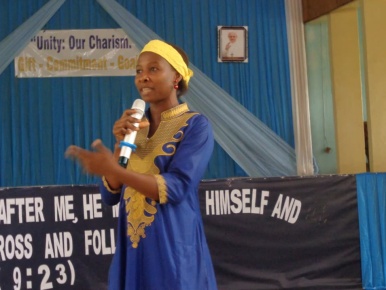
Sep 2, 2016 | Focolare Worldwide
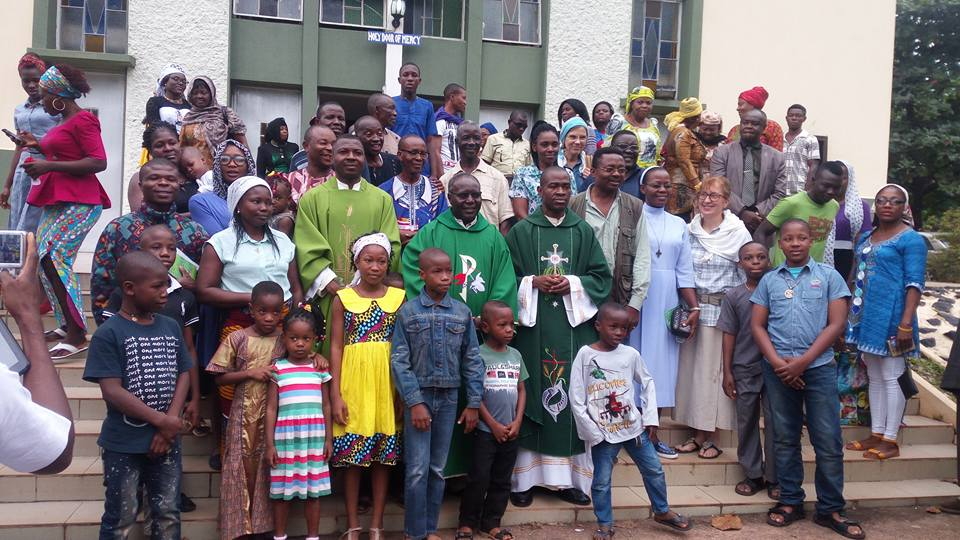 On July 2 – 7, 2016, four hundred people gathered, far from all the spotlights, for an intense experience of communion among young and old, children, priests, members of other Christian Churches and other Religions. Good deeds never make a lot of noise and the media is often more interested in news about violence, abuse of power, kidnappings and bombings. But Nigeria also has another side: the place where the Mariapolis was held, for example, Brigard National Seminary of Enugu, the largest Roman Catholic major seminary in the world. This says much about the faith that is lived so intensely in that land. The Mariapolis opened with a group of fifty young singers who presented a medley of Gospel hymns that had a lot harmony and rhythm. Suddenly the group divided as a number of couples emerged in traditional dress from the different regions of Nigeria. Each of them was identified as they crossed the stage amidst cheers and clapping. The scene closed with everyone in the hall on their feet and singing the National Anthem. There was an explosion of joy that seemed to echo the Bishop’s invitation during his homily to live out the theme of the Mariapolis with the “energy and imagination that is so common to the young.” This year’s theme was Unity: Gift, Commitment and Goal. Unity is a value that is dear to the Bishop because it is “so needed here in Nigeria.” Bishop Callistus Chukwuma Valentine Onaga of Enugu then encouraged everyone to live unity with three objectives in mind: solidarity, subsidiarity and the common good.
On July 2 – 7, 2016, four hundred people gathered, far from all the spotlights, for an intense experience of communion among young and old, children, priests, members of other Christian Churches and other Religions. Good deeds never make a lot of noise and the media is often more interested in news about violence, abuse of power, kidnappings and bombings. But Nigeria also has another side: the place where the Mariapolis was held, for example, Brigard National Seminary of Enugu, the largest Roman Catholic major seminary in the world. This says much about the faith that is lived so intensely in that land. The Mariapolis opened with a group of fifty young singers who presented a medley of Gospel hymns that had a lot harmony and rhythm. Suddenly the group divided as a number of couples emerged in traditional dress from the different regions of Nigeria. Each of them was identified as they crossed the stage amidst cheers and clapping. The scene closed with everyone in the hall on their feet and singing the National Anthem. There was an explosion of joy that seemed to echo the Bishop’s invitation during his homily to live out the theme of the Mariapolis with the “energy and imagination that is so common to the young.” This year’s theme was Unity: Gift, Commitment and Goal. Unity is a value that is dear to the Bishop because it is “so needed here in Nigeria.” Bishop Callistus Chukwuma Valentine Onaga of Enugu then encouraged everyone to live unity with three objectives in mind: solidarity, subsidiarity and the common good.  With such a high start, the topics regarding Focolare spirituality and its concrete application to daily life fell on fertile ground. The testimonies were particularly effective and at times quite moving. They were presented by couples and single people who were committed to living the Gospel in both their daily adventures and misadventures. The witness of a member of the Pentecostal Church and young Muslim was particularly significant and helped in understanding the concepts that were being presented. Afternoons were dedicated to a wide variety of workshops that highlighted how unity can improve the life of individuals and of society. One group discussed the treasures and the challenges of family life; another reflected on how to live unity in the midst of the nation’s current problems. Other workshops offered people the opportunity to acquire some new skills: a mini-course on electricity, another for beauticians, hair stylists, and so on. These were greatly appreciated and seen as a gift that reminded everyone of Chiara Lubich and her Economy of Communion project. “It’s not a matter of wealthy people being philanthropic,” she had remarked in 1999, “but of sharing among equals, mutual giving and receiving.” Everybody wished to seal their proposal to live unity by walking together through the Holy Door at the Seminary Chapel in order to embrace the grace of this special Year of Mercy and to renew their commitment to be merciful to one another and to all. Video of the Mariapolis in Enugu https://vimeo.com/181015319
With such a high start, the topics regarding Focolare spirituality and its concrete application to daily life fell on fertile ground. The testimonies were particularly effective and at times quite moving. They were presented by couples and single people who were committed to living the Gospel in both their daily adventures and misadventures. The witness of a member of the Pentecostal Church and young Muslim was particularly significant and helped in understanding the concepts that were being presented. Afternoons were dedicated to a wide variety of workshops that highlighted how unity can improve the life of individuals and of society. One group discussed the treasures and the challenges of family life; another reflected on how to live unity in the midst of the nation’s current problems. Other workshops offered people the opportunity to acquire some new skills: a mini-course on electricity, another for beauticians, hair stylists, and so on. These were greatly appreciated and seen as a gift that reminded everyone of Chiara Lubich and her Economy of Communion project. “It’s not a matter of wealthy people being philanthropic,” she had remarked in 1999, “but of sharing among equals, mutual giving and receiving.” Everybody wished to seal their proposal to live unity by walking together through the Holy Door at the Seminary Chapel in order to embrace the grace of this special Year of Mercy and to renew their commitment to be merciful to one another and to all. Video of the Mariapolis in Enugu https://vimeo.com/181015319
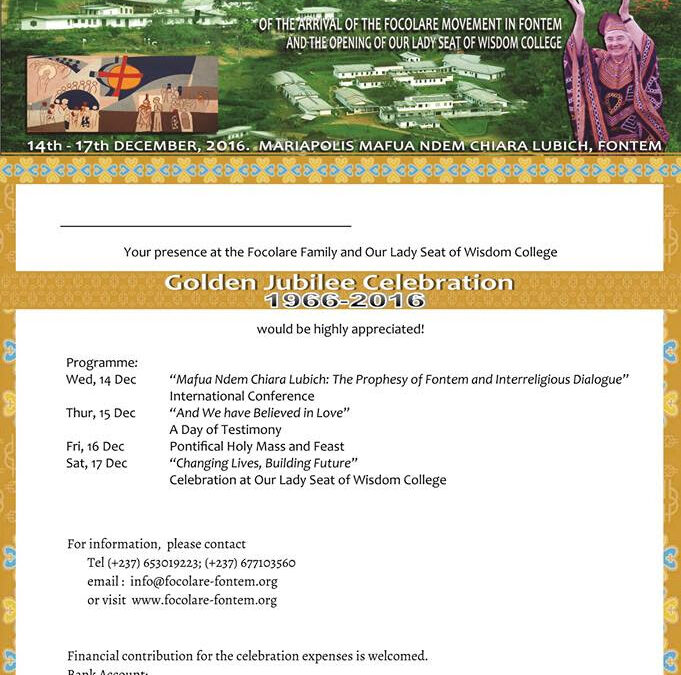
Sep 1, 2016 | Non categorizzato
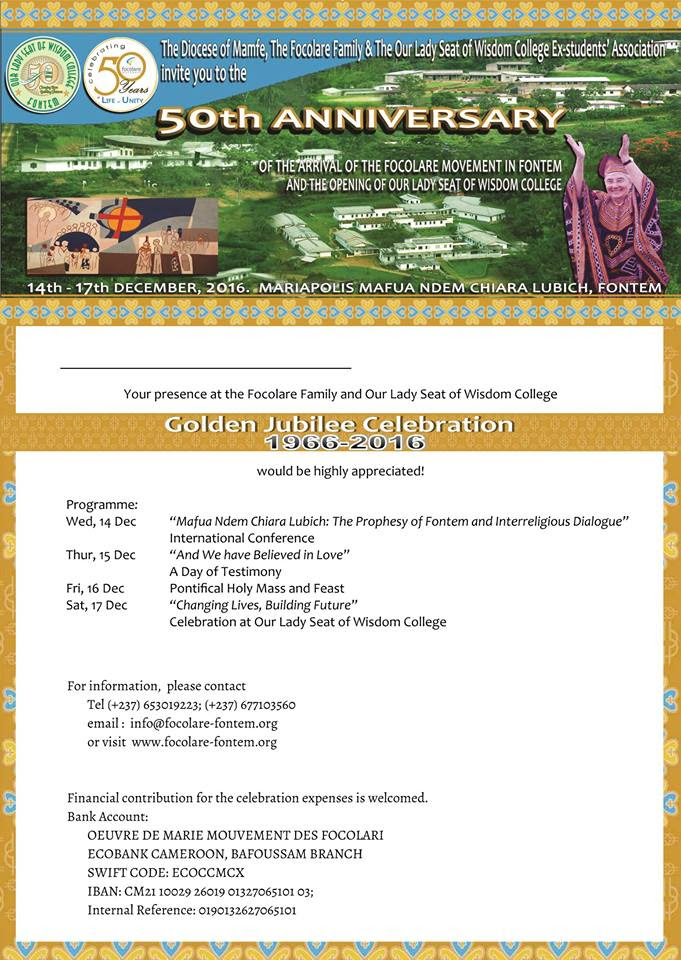 The diocese of Mamfe, the Focolare family and the Alumni Association of the school, “Our Lady Seat of Wisdom,” are extending an invitation to all for the 50th anniversary celebration (1966-2016) of the arrival of the Focolare Movement in Fontem (Camerun) and the opening of the school. The celebrations will be held at the “Mariapolis Mafua Ndem Chiara Lubich” (Fontem) from 14 to 17 December 2016. For information: info@focolare-fontem.org Web site: www.focolare-fontem.org
The diocese of Mamfe, the Focolare family and the Alumni Association of the school, “Our Lady Seat of Wisdom,” are extending an invitation to all for the 50th anniversary celebration (1966-2016) of the arrival of the Focolare Movement in Fontem (Camerun) and the opening of the school. The celebrations will be held at the “Mariapolis Mafua Ndem Chiara Lubich” (Fontem) from 14 to 17 December 2016. For information: info@focolare-fontem.org Web site: www.focolare-fontem.org

Sep 1, 2016 | Non categorizzato
 Just as Jesus had immediately inserted himself into the sub-layer of society by being born in a stable amongst the homeless, the refugees, the banished; so too, by allowing himself to be crucified and abandoned, he stood in the midst of the massive crowd of all those who suffer: the oppressed, the discouraged, the hungry and the defeated of every age. His focus on all those in misery gives humankind the measure of his love, and was nothing but the logical consequence of having completely fit himself into humanity’s brokenness. It was his way to make himself the last, the vilest of creatures, the most degraded – the way for to be at the root of all misery, a root that raises to Heaven. Infinity empties itself out of love. He had created the universe, developed and ruled it. The universe represents the production of something of boundless grandeur, somehow proportionate to the greatness of his mind, a world made of worlds, one more wondrous than the next. And humankind – tiny creatures on one small planet – after centuries of studying has only a minuscule idea of all that the universe contains: with stars that in our galaxy alone are four light-years apart and from the edges of the galaxy to its centre span a distance of 30 light-years which they can cover back and forth only 1,500 times in a billion years. In this universe that is infinitely too great for the human mind to fathom, he had also taken note of the misery of the human organisms on planet earth, and emptied himself in order to become one of them. He helped them to the point of giving them the Gospel and his very Self in the form of Food. The Redemption re-establishes the design of Creation, which includes that the existence of the stars and the atoms of the universe and the creatures of earth be in constant harmony for the realization of unity. This is why the Creator breathed into it the breath of life that is love. Health, peace and welfare flower in accordance with this precept. (Igino Giordani, L’unico amore, (Rome: Città Nuova, 1974) p. 64 and 105
Just as Jesus had immediately inserted himself into the sub-layer of society by being born in a stable amongst the homeless, the refugees, the banished; so too, by allowing himself to be crucified and abandoned, he stood in the midst of the massive crowd of all those who suffer: the oppressed, the discouraged, the hungry and the defeated of every age. His focus on all those in misery gives humankind the measure of his love, and was nothing but the logical consequence of having completely fit himself into humanity’s brokenness. It was his way to make himself the last, the vilest of creatures, the most degraded – the way for to be at the root of all misery, a root that raises to Heaven. Infinity empties itself out of love. He had created the universe, developed and ruled it. The universe represents the production of something of boundless grandeur, somehow proportionate to the greatness of his mind, a world made of worlds, one more wondrous than the next. And humankind – tiny creatures on one small planet – after centuries of studying has only a minuscule idea of all that the universe contains: with stars that in our galaxy alone are four light-years apart and from the edges of the galaxy to its centre span a distance of 30 light-years which they can cover back and forth only 1,500 times in a billion years. In this universe that is infinitely too great for the human mind to fathom, he had also taken note of the misery of the human organisms on planet earth, and emptied himself in order to become one of them. He helped them to the point of giving them the Gospel and his very Self in the form of Food. The Redemption re-establishes the design of Creation, which includes that the existence of the stars and the atoms of the universe and the creatures of earth be in constant harmony for the realization of unity. This is why the Creator breathed into it the breath of life that is love. Health, peace and welfare flower in accordance with this precept. (Igino Giordani, L’unico amore, (Rome: Città Nuova, 1974) p. 64 and 105

Aug 31, 2016 | Focolare Worldwide, Senza categoria
 “An unexpected phone call came one early morning. My elder brother’s voice at the other end of the line sounded confused. My nephew had just met an accident. He had been about to pick up my brother from work, but while driving he had dozed off, and those few seconds were enough for him to hit a motorcycle and kill two of his colleagues. They were both married men with families. It was indeed a shock for me; it was so heartbreaking. I went to look for my nephew. He was in a prison cell. I didn’t know what to say; I could only cry with him. Since it was early morning and my nephew and the other detainees had not yet had breakfast, I went to buy some food for them. Then I asked the prison guard if it was possible to clean the prison cell which was quite dirty. When my brother arrived and started crying, I stayed to comfort him. At this point, I realized that our next step had to be to ask for forgiveness from the families of the two victims. I told my brother that we should go to their wakes, face their families and ask for their forgiveness. My brother agreed, overcoming his own fear. We went to see the first family … and we went straight to the widow, who was crying. She was indeed quite angry with my brother. I felt I had to be there to absorb all her pain. Then I embraced her and said, ‘We are here to ask your forgiveness for what happened, without expecting to be forgiven.’ Then we also had to ask forgiveness from the victim’s parents. Their relatives advised us not to, because they were afraid that his mother would lose her calm and be beside herself with anger. But I strongly felt that we had to do it. I approached the mother, with my brother close behind me. Indeed, she cried aloud as I entrusted everything silently to God and embraced her tightly asking her to forgive us, also on behalf of my nephew. I assured her that if we would have found the way to take care of their family, providing for the education of the three daughters who were still in grade school. I was profoundly experiencing the pain and sorrow of t family, but at the same time, I fully experienced that peace that only God can give. Before leaving, we went to say goodbye to the widow. She did not say anything to my brother; but she did introduce me to her three daughters. This consoled me since I considered it an indication that I was able to establish some kind of a relationship with her. Some days later, with some friends from the Focolare, I attended the funeral… and also visited the family of the other victim. My nephew was released from detention three weeks later. A case was filed against him, but after several court hearings, the two families agreed to drop the case upon monetary compensation. My brothers and sisters pooled together the money that they had and we were able to offer monetary assistance to the families involved. This made our family more united, having helped one another. A year later, I thought of getting in touch with a widow of the accident victim. To my surprise she said, “I want to apologize for how I treated you and your brother when you came to the wake of my husband.” Since then we became friends… I was able to share about my faith in the love of God. Then I started sending her the daily ‘password’, a Gospel reflection to live by, which she now sends to all her friends. Two months ago, she invited me to a family gathering to celebrate her eldest daughter’s elementary school graduation. My heartbeat was galloping so fast at the party because I realized that all of them knew who I was—the aunt of the person who had caused the accident. The widow was with me the whole time, sharing with me beautiful memories of her husband. During a Mariapolis, at which she was present, she said, “You know, now I understand why God permitted everything that happened. Were it not for that accident, I would never have met you and the Focolare which has made a big change in my life.” She added that she had become closer to God. I thought this was my opportunity to ask her, “If you would meet my nephew someday, could you forgive him?” She answered, ‘I have already forgiven him. Look at my face. There are no traces of hatred for your nephew and your family.’ I felt that it was indeed an enormous grace to be a recipient of God’s mercy, and through his grace, to be also capable of offering it to one another.”
“An unexpected phone call came one early morning. My elder brother’s voice at the other end of the line sounded confused. My nephew had just met an accident. He had been about to pick up my brother from work, but while driving he had dozed off, and those few seconds were enough for him to hit a motorcycle and kill two of his colleagues. They were both married men with families. It was indeed a shock for me; it was so heartbreaking. I went to look for my nephew. He was in a prison cell. I didn’t know what to say; I could only cry with him. Since it was early morning and my nephew and the other detainees had not yet had breakfast, I went to buy some food for them. Then I asked the prison guard if it was possible to clean the prison cell which was quite dirty. When my brother arrived and started crying, I stayed to comfort him. At this point, I realized that our next step had to be to ask for forgiveness from the families of the two victims. I told my brother that we should go to their wakes, face their families and ask for their forgiveness. My brother agreed, overcoming his own fear. We went to see the first family … and we went straight to the widow, who was crying. She was indeed quite angry with my brother. I felt I had to be there to absorb all her pain. Then I embraced her and said, ‘We are here to ask your forgiveness for what happened, without expecting to be forgiven.’ Then we also had to ask forgiveness from the victim’s parents. Their relatives advised us not to, because they were afraid that his mother would lose her calm and be beside herself with anger. But I strongly felt that we had to do it. I approached the mother, with my brother close behind me. Indeed, she cried aloud as I entrusted everything silently to God and embraced her tightly asking her to forgive us, also on behalf of my nephew. I assured her that if we would have found the way to take care of their family, providing for the education of the three daughters who were still in grade school. I was profoundly experiencing the pain and sorrow of t family, but at the same time, I fully experienced that peace that only God can give. Before leaving, we went to say goodbye to the widow. She did not say anything to my brother; but she did introduce me to her three daughters. This consoled me since I considered it an indication that I was able to establish some kind of a relationship with her. Some days later, with some friends from the Focolare, I attended the funeral… and also visited the family of the other victim. My nephew was released from detention three weeks later. A case was filed against him, but after several court hearings, the two families agreed to drop the case upon monetary compensation. My brothers and sisters pooled together the money that they had and we were able to offer monetary assistance to the families involved. This made our family more united, having helped one another. A year later, I thought of getting in touch with a widow of the accident victim. To my surprise she said, “I want to apologize for how I treated you and your brother when you came to the wake of my husband.” Since then we became friends… I was able to share about my faith in the love of God. Then I started sending her the daily ‘password’, a Gospel reflection to live by, which she now sends to all her friends. Two months ago, she invited me to a family gathering to celebrate her eldest daughter’s elementary school graduation. My heartbeat was galloping so fast at the party because I realized that all of them knew who I was—the aunt of the person who had caused the accident. The widow was with me the whole time, sharing with me beautiful memories of her husband. During a Mariapolis, at which she was present, she said, “You know, now I understand why God permitted everything that happened. Were it not for that accident, I would never have met you and the Focolare which has made a big change in my life.” She added that she had become closer to God. I thought this was my opportunity to ask her, “If you would meet my nephew someday, could you forgive him?” She answered, ‘I have already forgiven him. Look at my face. There are no traces of hatred for your nephew and your family.’ I felt that it was indeed an enormous grace to be a recipient of God’s mercy, and through his grace, to be also capable of offering it to one another.”
M.R.
New City (Philippines)
![Collegamento CH Worldwide linkup]()
Aug 30, 2016 | Non categorizzato
 The news summary will be made available on the Collegamento CH website a few days before the Internet transmission. On the same website one can find all the previous linkups in various languages, as full editions as well as individual news video clips. Watch spot video
The news summary will be made available on the Collegamento CH website a few days before the Internet transmission. On the same website one can find all the previous linkups in various languages, as full editions as well as individual news video clips. Watch spot video
Aug 30, 2016 | Focolare Worldwide
- From 7- 17 September for Latin America, North America and Oceania
- From 28 September – 8 October for Africa, Asia and the Middle East
- From 15 – 23 October for Europe
Around a hundred participants will attend every session (Castel Gandolfo Mariapolis Centre, Rome), with a program partly in common and another part with various themes based on the demands and needs of each geographic area. The themes to be discussed will range from enculturation in Africa to the emergency of refugees and dialogue with Islam in Europe; other topics will focus on the challenges in Latin America, Asia, the Middle East, North America and Oceania in the social and ecclesiastic fields, from the perspectives of the family, the new generations, ecumenical and interreligious dialogue, and many other themes.
Aug 30, 2016 | Focolare Worldwide
- From 7- 17 September for Latin America, North America and Oceania
- From 28 September – 8 October for Africa, Asia and the Middle East
- From 15 – 23 October for Europe
Around a hundred participants will attend every session (Castel Gandolfo Mariapolis Centre, Rome), with a program partly in common and another part with various themes based on the demands and needs of each geographic area. The themes to be discussed will range from inculturation in Africa to the emergency of refugees and dialogue with Islam in Europe; other topics will focus on the challenges in Latin America, Asia, the Middle East, North America and Oceania in the social and ecclesiastic fields, from the perspectives of the family, the new generations, ecumenical and interreligious dialogue, and many other themes.

 Elisa with the entire family – a twin brother, an elder brother, daddy, and the grandmothers – just a few weeks earlier, had been to the Mariapolis – the Focolare’s summer gathering – with about a hundred other people. It had been an occasion to know each other, share life experiences, and take a step ahead together. Everyone remembers Elisa who before leaving, with her gay and contagious ways had shot a video of the impressions of her group with the help of her twin brother. “The Mariapolis is an experience that leaves its mark in one’s heart forever. I hope to go to the Mariapolis always,” she had texted her mother upon returning home. Instead, Gabriele, her little 8-year-old cousin, in mid-June had participated for the second consecutive year in the little “Gen4 congress.” It was an enchanting three-day event with the little kids who understand “the things of God” better than anyone else. A photo shows him in the role of an angel playing a trumpet upon the passage through the Door of Mercy, together with all the other boys. In the morning of 24 August the news of the earthquake arrived, and also the anguish: Elisa, Gabriele and their grandmothers were under the ruins and all feared the outcome for those who were missing. A chain of prayers immediately started like a tam-tam, but in the evening it was confirmed: they didn’t make it.
Elisa with the entire family – a twin brother, an elder brother, daddy, and the grandmothers – just a few weeks earlier, had been to the Mariapolis – the Focolare’s summer gathering – with about a hundred other people. It had been an occasion to know each other, share life experiences, and take a step ahead together. Everyone remembers Elisa who before leaving, with her gay and contagious ways had shot a video of the impressions of her group with the help of her twin brother. “The Mariapolis is an experience that leaves its mark in one’s heart forever. I hope to go to the Mariapolis always,” she had texted her mother upon returning home. Instead, Gabriele, her little 8-year-old cousin, in mid-June had participated for the second consecutive year in the little “Gen4 congress.” It was an enchanting three-day event with the little kids who understand “the things of God” better than anyone else. A photo shows him in the role of an angel playing a trumpet upon the passage through the Door of Mercy, together with all the other boys. In the morning of 24 August the news of the earthquake arrived, and also the anguish: Elisa, Gabriele and their grandmothers were under the ruins and all feared the outcome for those who were missing. A chain of prayers immediately started like a tam-tam, but in the evening it was confirmed: they didn’t make it.  Their families immediately gave an unwavering testimony: “Their faith in God’s love was such that even in this immense suffering, they enlightened us with renewed determination to live for that which does not pass”, wrote Maria Voce, President of the Focolare, to the stricken communities and families, the day after the earthquake. Meanwhile the Focolare communities throughout the world and Italy had launched the rescue system.
Their families immediately gave an unwavering testimony: “Their faith in God’s love was such that even in this immense suffering, they enlightened us with renewed determination to live for that which does not pass”, wrote Maria Voce, President of the Focolare, to the stricken communities and families, the day after the earthquake. Meanwhile the Focolare communities throughout the world and Italy had launched the rescue system. 










